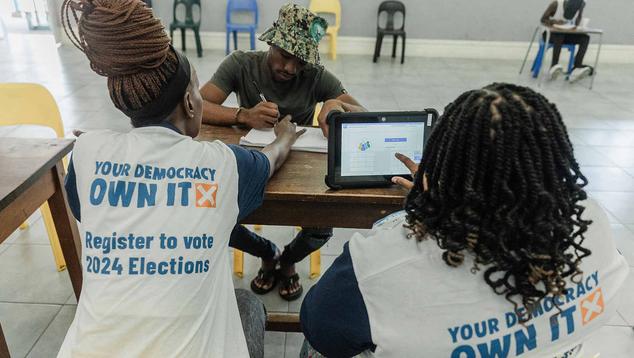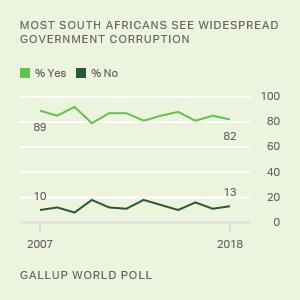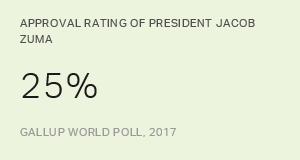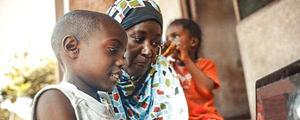WASHINGTON, D.C. -- South Africans head to the polls next week to decide whether the political party that has led their country since the end of apartheid will lead it into the future.
Gallup surveys in South Africa reveal a level of disenchantment that does not bode well for the incumbent African National Congress (ANC) party, which could lose its parliamentary majority for the first time in 30 years.
Approval of Country’s Leadership Languishes
After the ANC’s landmark win in the 1994 elections, which propelled Nelson Mandela to the presidency, the party enjoyed a strong mandate across the country, cresting with nearly 70% of the vote in 2004. However, the party has been on a downward trajectory for the past two decades, plagued by poor economic conditions, rising unemployment and a series of scandals.
These struggles are reflected in South Africans’ approval of their leaders’ job performance. In Gallup’s initial reading on this question in 2007, a record-high two-thirds of South Africans (67%) said they approved of the country’s leadership. However, approval declined sharply in the following years, and it has hovered near 30% in 2022 and 2023.
The ANC has governed the country continuously since it was allowed to participate in elections in 1994. Yet growing and persistent concerns about the economy, safety and infrastructure have seen its support decline over the past 20 years. The coming elections may serve as a turning point for the nation if the ANC receives less than 50% of the vote, dropping the party out of the majority position it has held and necessitating negotiations to form a coalition government.
The Democratic Alliance (DA) is the ANC’s main opposition party, garnering 20% of the vote in the previous elections. The DA’s leadership has positioned the party as pro-business and has left open the possibility of entering a deal with the ANC, should the incumbent party fail to gain enough votes to hold on to power in parliament.
The Economic Freedom Fighters (EFF), a far-left populist party led by the controversial Julius Malema, is a stark contrast to the DA. While Malema’s promises of jobs have resonated with youth, his more controversial statements, like the expropriation of White-owned lands, have caused others to express concern. Representing a particular threat to the ruling party is the breakaway uMkhonto weSizwe Party (MK), led by former President (and former head of the ANC) Jacob Zuma. Zuma himself has been barred from running for a seat.
Economy, Safety Remain Major Concerns
Compounding crises have afflicted the country over the past three decades, including persistently high poverty, with the World Bank estimating that 62.7% of the population lives at or below the upper-middle-income poverty line of $6.85 per day.
Since 2008, the percentage of South Africans who struggled to afford food has dipped below 50% only twice; it stood at 58% in 2023. Residents are also pessimistic about the economy in their local area, with 57% saying conditions are getting worse, compared with 31% who feel it is getting better.
By some measures, South Africa has one of the worst unemployment rates in the world, with the official rate rising to 32.1% in the fourth quarter of last year. Gallup’s Unemployment Index finds 29% unemployed in 2023, the third-worst rate in sub-Saharan Africa behind Somalia and Botswana. The difference is even more stark among youth, with a 37% unemployment rate among those aged 15 to 29, compared with 25% for those aged 30 to 49.
Safety and security have long been worries in South Africa. They have become a top issue ahead of the elections as the country continues to have one of the highest violent crime rates in the world. Over the past two years, the homicide rate in South Africa was 45 per 100,000 -- compared with 6.3 in the U.S.
In this climate, just 30% of South Africans say they feel safe walking alone at night in their area -- substantially lower than the median of 49% across sub-Saharan Africa and one of the lowest rates in the world last year.
Quality of Water, Infrastructure Issues Likely Trouble Voters
Weighing further on public opinion is the state of the country’s electrical grid. While known for years as having some of the best infrastructure on the continent, over the past decade, South Africa has been plagued by “load-shedding” -- intermittent electricity blackouts that can last up to 12 hours per day.
Analysis by the South African Reserve found that the ongoing energy crisis has exacerbated a decrease in economic growth in the country. The national energy provider, Eskom, has struggled against aging facilities, corruption and sabotage, including the cyanide poisoning of its former CEO.
In addition to supply issues with electricity, parts of the country -- including Johannesburg -- have faced water shortages. In March, taps ran dry across Gauteng, South Africa's most-populous province, for nearly two weeks during a severe heat wave. Historically, as many as 81% of South Africans (in 2007) have reported being satisfied with the quality of water in the city or area where they live, but the 55% who said the same in 2023 is one of the nation’s lowest levels on record.
South Africans May Vote With Their Feet
Increasingly dissatisfied South Africans are considering greener pastures elsewhere. For those not looking to leave the country entirely, the term “semigration” has been coined for those moving between provinces, with many opting to travel to Cape Town in the west to seek better conditions.
However, the desire to leave the country entirely has been on the rise as well. While just 8% of South Africans reported wanting to permanently move to another country in 2007, this has slowly risen, reaching 30% for the first time in 2022 and inching up to 32% in 2023.
Implications
Many South Africans remember the ANC for its role in the struggle and triumph over apartheid 30 years ago. Yet decades of compounding issues related to crime, corruption and poverty have eroded their support and left residents looking for alternatives. While no single opposition party is expected to surpass the ANC in terms of total vote share, a coalition government is possible.
Such a government, regardless of whether it includes the ANC, will be hard-pressed to deal with the multitude of issues facing the country, including restoring voters’ trust. Heading into the elections, 38% of South Africans express confidence in the honesty of elections, down from a peak of 74% who reported the same in 2007. Whichever party takes control after May 29 will need to act quickly to assuage voters’ worries and make progress on improving the economy, safety and infrastructure of the country.
To stay up to date with the latest Gallup News insights and updates, follow us on X.
For complete methodology and specific survey dates, please review Gallup's Country Data Set details.
Learn more about how the Gallup World Poll works.




